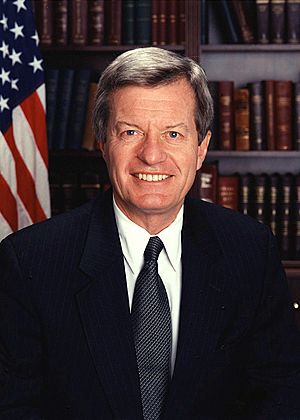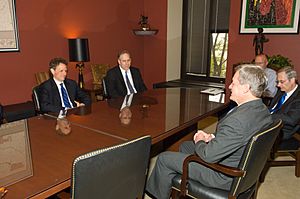Max Baucus facts for kids
Quick facts for kids
Max Baucus
|
|||||||||||||||||||||||||||||||||||
|---|---|---|---|---|---|---|---|---|---|---|---|---|---|---|---|---|---|---|---|---|---|---|---|---|---|---|---|---|---|---|---|---|---|---|---|
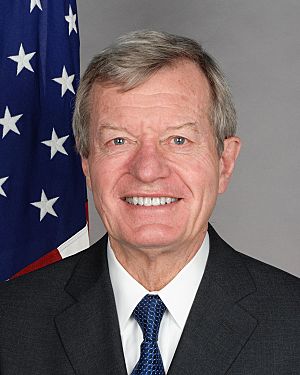
Official portrait, 2014
|
|||||||||||||||||||||||||||||||||||
| 11th United States Ambassador to China | |||||||||||||||||||||||||||||||||||
| In office March 20, 2014 – January 16, 2017 |
|||||||||||||||||||||||||||||||||||
| President | Barack Obama | ||||||||||||||||||||||||||||||||||
| Preceded by | Gary Locke | ||||||||||||||||||||||||||||||||||
| Succeeded by | Terry Branstad | ||||||||||||||||||||||||||||||||||
| United States Senator from Montana |
|||||||||||||||||||||||||||||||||||
| In office December 15, 1978 – February 6, 2014 |
|||||||||||||||||||||||||||||||||||
| Preceded by | Paul Hatfield | ||||||||||||||||||||||||||||||||||
| Succeeded by | John Walsh | ||||||||||||||||||||||||||||||||||
|
|||||||||||||||||||||||||||||||||||
| Member of the U.S. House of Representatives from Montana's 1st district |
|||||||||||||||||||||||||||||||||||
| In office January 3, 1975 – December 14, 1978 |
|||||||||||||||||||||||||||||||||||
| Preceded by | Richard Shoup | ||||||||||||||||||||||||||||||||||
| Succeeded by | Pat Williams | ||||||||||||||||||||||||||||||||||
| Member of the Montana House of Representatives from the 18th district |
|||||||||||||||||||||||||||||||||||
| In office January 1973 – January 1975 |
|||||||||||||||||||||||||||||||||||
| Personal details | |||||||||||||||||||||||||||||||||||
| Born |
Maxwell Sieben Enke
December 11, 1941 Helena, Montana, U.S. |
||||||||||||||||||||||||||||||||||
| Political party | Democratic | ||||||||||||||||||||||||||||||||||
| Spouses |
Ann Geracimos
(m. 1975; div. 1982)Wanda Minge
(m. 1984; div. 2009)Melodee Hanes
(m. 2011) |
||||||||||||||||||||||||||||||||||
| Children | 1 | ||||||||||||||||||||||||||||||||||
| Education | Stanford University (BA, JD) | ||||||||||||||||||||||||||||||||||
Maxwell Sieben Baucus (born December 11, 1941) is an American politician. He served as a United States senator for Montana from 1978 to 2014. He was a member of the Democratic Party. Baucus was a U.S. senator for over 35 years. This made him the longest-serving U.S. senator in Montana history.
After his time in the Senate, President Barack Obama chose Baucus to be the U.S. Ambassador to China. He held this important job from 2014 until 2017. As Chairman of the Senate Finance Committee, Baucus helped shape discussions about health care reform in the United States. He also worked on committees dealing with taxes, agriculture, and the environment. Before becoming a senator, Baucus was a member of the United States House of Representatives from 1975 to 1978. He also served in the Montana House of Representatives from 1973 to 1974.
Contents
Early Life and Education
Maxwell Sieben Enke was born on December 11, 1941, in Helena, Montana. His mother was Jean Sheriff, a historian and rancher. His father was Stephen Enke, an economist. Max lived in Los Angeles, California, until he was two years old. Then, his mother moved back to Helena with him.
His mother later married John J. Baucus. Max and his mother took his new stepfather's last name. Max graduated from Helena High School in 1959. He then attended Carleton College for a year. After that, he transferred to Stanford University. He earned a degree in economics in 1964. He then went to Stanford Law School and became a lawyer in 1967.
Starting His Career in Public Service
After law school, Baucus worked as a lawyer for government agencies in Washington, D.C.. He worked for the Civil Aeronautics Board and the Securities and Exchange Commission. In 1971, he moved back to Montana. He became the executive director for Montana's Constitutional Convention. He also opened a law office in Missoula, Montana.
In November 1972, Baucus was elected to the Montana House of Representatives. He served as a state representative for Missoula. In November 1974, he was elected to the United States House of Representatives. He was re-elected in 1976.
Serving in the U.S. Senate
Baucus was elected to the U.S. Senate on November 7, 1978. He officially started his term on January 3, 1979. However, Montana's Governor, Thomas Lee Judge, appointed him to the Senate early. This happened on December 15, 1978, to fill a sudden opening. On April 23, 2013, Baucus announced he would not run for a seventh term.
Important Senate Committees
During his time in the Senate, Baucus served on several important committees:
- Committee on Agriculture, Nutrition and Forestry
- Committee on Finance (He was the Chairman of this committee.)
- Committee on Environment and Public Works
- Joint Committee on Taxation (He was also the Chairman of this committee.)
- Joint Select Committee on Deficit Reduction
Max Baucus's Political Views
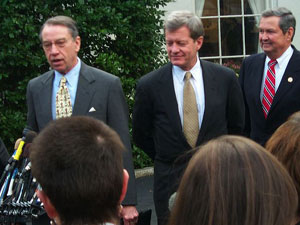
As a Democratic senator, Baucus sometimes voted differently from his party. This happened on issues like taxes, the environment, health care, and gun control.
Views on Civil Rights
Baucus had a mixed record on civil rights issues. He supported some measures to stop job discrimination and hate crimes based on sexual orientation. In 2012, he stated his support for same-sex marriage.
Voting Rights for Washington, D.C.
Baucus voted against giving voting representation to the District of Columbia.
Economic Policies
Baucus generally supported business-friendly policies. He voted to make it harder for people to file for bankruptcy. He often visited workplaces in Montana for events he called "Work Days."
He voted for the Bush tax cuts in 2001. He usually voted against canceling parts of these tax cuts. In 2008, he voted to permanently remove the estate tax. In 2005, Baucus voted against ending tax benefits for companies that moved U.S. jobs overseas.
Environmental Stance
Baucus had a mixed record on environmental issues. He voted against oil and gas subsidies. He also voted against drilling in the Arctic National Wildlife Refuge. He supported national rules to reduce oil use and encourage hydrogen-powered cars. However, he voted against some fuel efficiency standards for cars. He also voted against increasing federal money for solar and wind power. He was a key leader in the large Montana Legacy Project conservation effort.
Foreign Policy Views
Cuba
As a senator, Baucus was against the United States embargo against Cuba. He also opposed travel restrictions to Cuba.
Iraq War
Baucus voted for the Authorization for Use of Military Force Against Iraq Resolution of 2002. This resolution allowed military action in Iraq. Later, in 2007, he spoke against increasing troop levels in Iraq. He called for U.S. troops to leave Iraq in stages.
Trade with Japan
Baucus went on a trade trip to Japan. He visited a Tesla Motors facility in Tokyo. He said that U.S. exports help the American economy and create jobs. He believed that opening markets in Japan and Asia could boost U.S. exports.
Trade with Vietnam
In 2009, Baucus spoke out against a possible U.S. trade war with Vietnam over fish. He argued that there was no good reason to ban imports of Vietnamese pangasius fish. He said that if the U.S. expects other countries to follow trade rules, it must do the same.
Gun Policy
In 1994, Baucus voted for a ban on certain "Assault Weapons." In 2013, he was one of four Democrats who voted against expanding background checks for gun buyers. He is an avid hunter. In 1999, he was the only Democrat to vote against a measure to regulate gun sales at gun shows. This vote came after the Columbine High School massacre.
Health Care Reform Efforts
In 2013, Baucus expressed concerns about how the Affordable Care Act (Obamacare) was being put into action. He worried it could be a "train-wreck" for small businesses. He said businesses did not understand the new rules or penalties. Baucus strongly supported the goal of the law. He said, "I spent two years of my life working on the Affordable Care Act. There is nothing I want more than for it to succeed." However, he was critical of how it was rolled out.
Role on the Senate Finance Committee
As chairman of the Senate Finance Committee, Baucus held the first Senate meeting to discuss health care reform. He invited representatives from drug companies, insurance companies, and hospitals. Some people criticized this meeting because it did not include groups that wanted a "single-payer" health care system. A single-payer system means the government pays for most health care.
Views on Single-Payer Health Care
Advocates for single-payer health care protested at a Senate Finance Committee meeting in 2009. They were upset that Baucus said single-payer was "not an option." Baucus had some protesters removed by police. He later admitted it was a mistake to rule out a single-payer plan. He said it made many people feel left out.
Baucus often used the term "uniquely American solution" for health reform. He believed America was not ready for any form of single-payer health care. Years after leaving the Senate, Baucus said it would make sense to seriously consider a single-payer system.
U.S. Ambassador to China
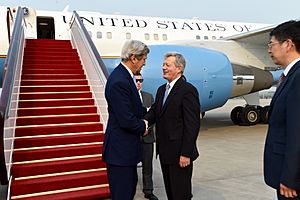
On December 20, 2013, President Barack Obama announced he would nominate Baucus to be the Ambassador to China. The Senate confirmed his nomination on February 6, 2014, with a vote of 96–0. Baucus was sworn in on February 21, 2014. He replaced Gary Locke as Ambassador. Baucus did not speak Mandarin Chinese, which was unusual for this role.
Baucus finished his time as Ambassador in January 2017. President Donald Trump then nominated Terry Branstad to be the next Ambassador to China.
Later Career
After his ambassadorship, Baucus served on the Board of Advisors for Alibaba Group until May 2019.
Personal Life
Baucus has one son from his first marriage to Ann Geracimos. They divorced in 1982. In April 2009, Baucus and his second wife, Wanda Minge, divorced after 25 years of marriage. On July 2, 2011, Baucus married Melodee Hanes.
Baucus is an active person. He has completed a 50-mile ultramarathon. He has also helped a runner named Nikki Kimball in the 100-mile Western States Endurance Run.
See also
 In Spanish: Max Baucus para niños
In Spanish: Max Baucus para niños
 | Leon Lynch |
 | Milton P. Webster |
 | Ferdinand Smith |


